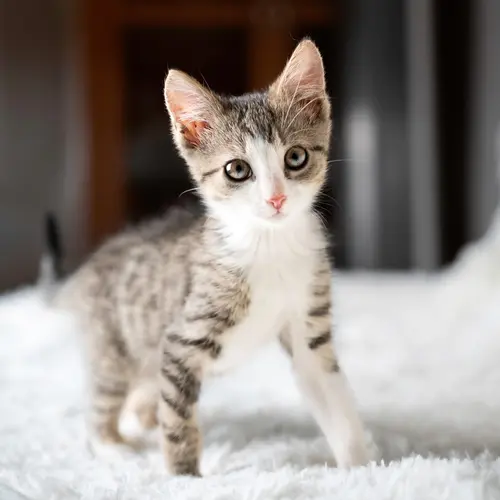An occasional sneeze in a cat is normal and no real cause for alarm. Just as in humans, sneezing in cats is an explosive release of air through the nose and mouth - often the body’s response to irritants in the nasal passages. Sometimes, excitement or movement can bring on sneezing in cats.
However, if your cat’s sneezing won’t go away, or if other symptoms have cropped up along with sneezing, you may need to check with your veterinarian to see if treatment is needed.
Causes of Sneezing
If your cat is sneezing a lot, your veterinarian may initially suspect a cause based on a review of your cat’s symptoms. One of the main causes of sneezing is infection. In some cases, the vet may take a swab from the mouth, throat, eyes, or nose and send it to a lab to confirm an infection. Inhaled irritants or allergens are other common causes of sneezing in cats.
Viral, bacterial, or fungal infections. If you’ve got a sneezing cat, chances are good the cat has an upper respiratory infection. Similar to colds in humans, these infections are more common in young cats, especially in those coming from animal shelters. Many of these infections can be prevented with early and complete vaccinations.
Viral infections that most commonly cause sneezing in cats are:
- Feline herpes virus. Cats catch herpes from exposure to other cats who are infected. Stress can cause a flare-up as well as transmission to other cats. Treatment is aimed at controlling the symptoms. Feline herpes virus is NOT contagious to humans.
- Feline calicivirus. This virus is highly contagious between cats. Mouth ulcers are the most common problem, but it can affect the respiratory tract and even cause pneumonia.
These infections may make your cat more likely to develop other respiratory problems that can exacerbate sneezing. For example, a cat with herpes may also develop a secondary bacterial infection. These are often treatable with antibiotics.
A wide range of other infections may also lead to sneezing. They include:
- Feline infectious peritonitis, which may cause no symptoms, mild symptoms, or more severe symptoms over time
- Feline Immunodeficiency Virus (FIV), which develops slowly, but severely impacts a cat’s immune system, leaving the cat vulnerable to other infections
- Feline leukemia, a serious and often fatal infection
- Chlamydia, which often produces an eye infection (conjunctivitis)
- Bordetella
- Mycoplasma
Inhaled irritants or allergens. If your cat only sneezes once in a while, something may simply be irritating the nasal passages. Look for patterns in your cat’s sneezing. Does it occur after you’ve lit the candles at the dinner table? After your cat leaves the litter box? After you’ve cleaned the house?
These are all examples of potential irritants or allergens (substances that cause allergic reactions) in cats:
- Cigarette smoke
- Perfume
- Pest sprays
- Cat litter, especially types that create dust
- Cleaning agents
- Candles
- Dust
- Pollen
- Mold
In cats, allergies are a less common cause of sneezing than in humans. If sneezing is related to allergies, sometimes itchy skin is also present.
Other potential causes of sneezing. A variety of other factors may contribute to sneezing in cats. For example, it’s common for cats to experience sneezing within four to seven days of receiving an intranasal vaccine. This sneezing lasts for no more than several days. Cats may also sneeze to try to dislodge a blockage in their nasal passages. An infection or inflammation of a tooth root may cause drainage into the sinuses and may also cause sneezing. In very rare cases, sneezing in cats can be a sign of cancer.
Sneezing and Other Symptoms
Symptoms that may accompany sneezing in cats may be the result of a wide range of infections and other problems. These symptoms may include:
- Eye discharge, swelling, or ulcers
- Excessive nasal discharge, sometimes yellow or green in color (sometimes a sign of a bacterial infection)
- Fatigue or depression
- Fever
- Drooling
- Decreased appetite or weight loss
- Enlarged lymph nodes
- Wheezing or coughing
- Poor coat condition
- Trouble breathing
- Diarrhea
When to See the Vet
If your cat sneezes only once in a while, has no other symptoms, or has only mild symptoms, you may want to simply monitor them for a few days. Keep your cat indoors and watch for changes. But be sure to call the vet if your cat sneezes continuously or often, sneezes blood, or has other signs such as those listed above. They may be signs of an illness or condition that needs veterinary care.
Treatment depends on the cause of the sneezing. In mild cases, the vet may suggest taking steps to simply help your cat be more comfortable -- like using a humidifier. In other cases, antibiotics, antihistamines, steroids, or fluids may be needed. Rarely, cats that don’t respond to medical therapy may require surgery.

